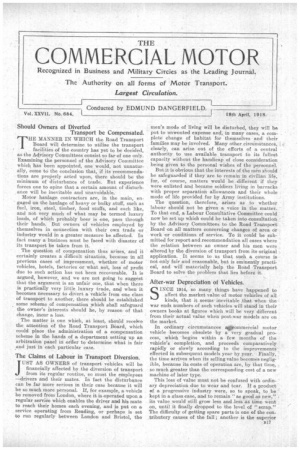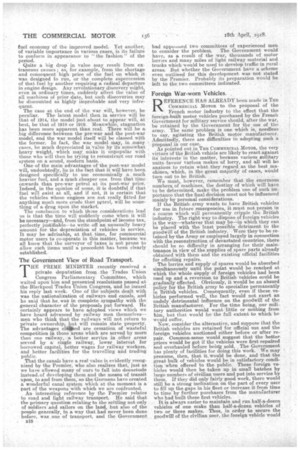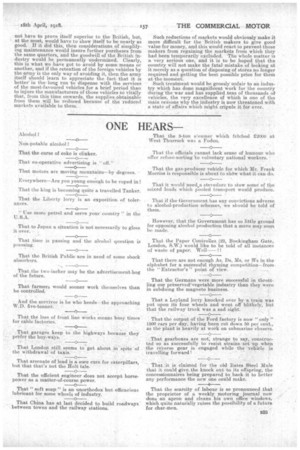Should Owners of Diverted Transport be Compensated.
Page 1

Page 2

Page 3

If you've noticed an error in this article please click here to report it so we can fix it.
THE MANNER IN WHICH the Road Transport Board will determine to utilise the transport facilities of the country has yet to be decided, as the Advisory Committees consist so far of one only. Examining the personnel of the Advisory Committee which has been appointed, one would, not unnaturally, come to the conclusion that, if its recommendations are properly acted upon, there should be the minimum of disturbance of trade. But experience forces one to opine that a certain amount of disturbance will be inevitable and unavoidable.
Motor haulage contractors are, in the main, engaged on the haulage of heavy or bulky stuff, such as fuel, iron, steel, timber, food stuffs, and such like, and not very much of what may be termed luxury loads, of which probably beer is one, pass through their hands. But owners of vehicles employed by themselves in connection with their own trade or industry would in a greater measure be affected. In fact many a business must be faced with disaster of its transport be taken from it. . . The question of compensation thus arises, and it certainly creates a difficult situation, because in all previous cases of impressment, whether of motor vehicles, hotels, factories or what not, loss of profit due to such action has not been recoverable. It is argued, however, and we are not going to suggest that the argument is an =lair one, that when there is practically very little luxury trade, and when it becomes necessary to divert a vehicle from one class of transport to another, there should be established some scheme of compensation ;which shall safeguard the owner's interests should he, by reason of that change, incur a loss. The matter is one which, at least, should receive the attention of the Road Transport Beard, which could place the administration of a compensation scheme in the hands of a department setting up an arbitration panel in eider to determine what is fair and just in each particular case.
The Claims of Labour in Transport Diversion.
JUST AS OWNERS of transport vehicles will be financially affected by the diversion of transport from its regular routine, so must the employees —drivers and their mates. In fact the disturbance can be far more serious in their case because it will be so much more personal. If, for example, a vehicle be removed from London, where it is operated upon a regular service which enables the driver and his mate to reach their homes each evening, and is put on a, service operating from Reading, or perhaps is set to run regularly between London and Bristol, the men's mode of living will be disturbed, they will be put to unwonted expense and, in many cases, a corn. plete change of habitat for themselves and their families may be involved. Many other circimstances, , clearly, c,an arise out of the efforts of a central authority to use available transport to its fullest capacity without the handicap of close consideration being given to the personal wishes of the personnel. But it is obvious that the interests of the men should be safeguarded if they are to remain in civilian life, for, of course, matters would be different if they were enlisted and became soldiers living in barracks with proper separation allowances and their whole mode of life provided for by Army institutions. The question, therefore, arises as to whether labour should not be given a voice in. the matter. To that end, a Labour Consultative Committee could now be set up which could be taken into consultation by the Advisory Committees to the Road Transport Board on all matters concerning changes of area or work or conditions of service. To it could be submitted for report and recommendation all cases where the relation between an owner and his men were altered by the diversion of transport from its original application. . It seems to us that such a course is not only fair and reasonable, but is eminently practical, and will materially help the Road Transport Board to solve the problem that lies before it.
After-war Depreciation of Vehicles.
SINCE 1914, so many things have happened to affect the market value of motor vehicles of all kinds, that it seems inevitable ,that when the war ends numbers of such vehicles-will stand in their owners books at figures which will be very different from their actual value when post-war models are on the market.
In ordinary circumstances aileommercial motor vehicle becomes obsolete by a very gradual process, which begins within a few months of the vehicle's completion, and proceeds comparatively rapidly or slowly according to the improvements effected in subsequent models year by year. Finally,: the time arrives when its selling value becomes negligible, because its costs of operation are, by that time, so much greater than the corresponding cost of a new machine of later type. This loss of value must not be confused with ordinary depreciation due to wear and tear. If a product , of a progressive industry were, so to speak, to be ' kept in a glass case and to remain "as good as new," , its value would still grow less and ,less as time went on, until it finally dropped to the level of "scrap." The difficulty of getting spare parts is one of the contributory causes of the fall ; another is the superior
fuel economy of the improved model. Yet another, of variable importance in various cases, is its failure to conform in appearance to "the fashion" of the _ period. Quite a big drop in value may result from extraneous causes ; as, for example, from the shortage and consequent high price of the fuel on which it. was designed to run or the complete supercession of that fuel by another requiring a radical departure in engine design. Any revolutionary discovery might, even in ordinary times suddenly affect the value -of all machines of prior date, but such discoveries may be discounted as highly improbable and very infrequent.
The case at the end of the war will, however; be peculiar. The latest model then, in service will be that of 1914, the model just about to appear will, at best, be that of 1918 or 1919. Meanwhile, stagnation has been more apparent than real. There will be a big difference between the pre-war and the post-war model, and the war model itself will be classed with the former. In feet, the war model may, in many ca,ses, be much depreciated in ‘value by its somewhat 'heavy weight, which may make it unpopular with those who will then be trying to reeoristruet our road
system on a sound, modern basis. One of the main advantages of the post-war model will, undoubtedly, lie in the fact that it will have been designed specifically to use economically a much heavier fuel, and a much cheaper one from that time onwards than pre-war petrol at its post-war price. Indeed, in the opinion of some, it is doubtful if that fuel will exist at all, and if not, it is certain that the vehicles whose engines are not really fitted foranything much more crude than petrol, will be something of a drug upon the Market.
The conclusion to which the considerations lead us is that the time will suddenly come when it will be necessary—atid, from the standpoint of income tax, perfectly justifiable—to write off an unueually heavy amount for the depreciation of vehicles in service. It may be advisable at that time for commercial' motor users to co-operate in this matter, because we all know that the surveyor of taxes is not prone to allow such items until a precedent has been clearly
established. _
The Government View of Road Transport.
THE PRIME MINISTER recently received a private deputation from .the Trades Union Congress Parliamentary Committee, which waited upon him and presented resolutions passed at the Blackpool Trades -Union Congress, and he issued his reply last week. One of the subjects dealt with was the nationalization of railways and canals, and he said that he was in complete sympathy with the general character of the proposals put forward. He certainly appears to have adopted views which we have heard advanced by railway men themselves— men who think that the railways will not return to private ownership, but will remain state property. The advantages claitied are cessation of wasteful competition in those areas which are served by more than one railway, a better service in other areas served by a single railway, lower interest for borrowed capital, better wages for railway workers, and better facilities for the travelling and trading public.
That the canals have a real value is evidently recognized by the Premier, who also realizes that, just as we have allowed many of ours to fall into desuetude instead, of developing them and the means of tranait upon, to and from them, so the Germans have created a, wonderful canal system which at the moment is a part of the weapons with which we are confronted. An interesting reference by the Premier relates to road and light railway transport. He said that the primary question relating to the settling not only of aoldiers hand sailors on the land, but also of the people generally, in a way that had never been done before, was one of transport, and the Government
BIB had appoureed two committees of experienced men to consider the problem. The Government would have, as a result of the war, thousands of motor lorries and many miles of light railway material and trucks which would be used to develop traffic in rural areas. But whether the Government have a scheme even outlined for this development was not stated by the Premier. Probably its preparation would be left to the two committees indicated.
Foreign War-worn Vehicles. ,
EFERENCE HAS ALREADY been made in THE COMMERCIAL MOTOR to the proposal of the French motor industry to the effect that the foreign-built motor vehicles purchased by the French Government for military service should, after the war, be retained by the Government for the use of the army. The same problem is one which is, needless to say, agitating the British motor manufacturer. Admittedly, there are dculties in adopting such a proposa,1 in our case. As pointed out in TILE COMMERCIAL MOTOR, the very virtues of the British vehicle are likelyto react against its interests in the matter, because various military uniti favour varietal makes of lorry, and all will be anxious to retain what they regard as the best _machines, which, in the great majority of cases, would turn out to be Btitish. , We must, however, remember that the enormous numbers. of machines the destiny of which will have to be determined, male the problem one of such importance that the final decision must not be influenced mainly by Personal considerations. If the British army wants to have British vehicles for use in future emergencies, it must not persist in a course which will permanently cripple the British industry. The right way to dispose of foreign vehicles is the way—whatever that may be—in which they can be placed with the least possible detriment to the goodwill of the British industry. Were they to he retained by the Army or employed largely in connection with the reconstruction of devastated countries, there should be no difficulty in arranging for their maintenance in view of the supplies of spare parts already obtained with them and the existing official facilities for effecting repairs.
The lorries and supply of spares would be absorbed simultaneously until the point would be reached at which the whole supply of foreigia vehicles bad been used up and a reversion to British vehicles could be gradually effected. Obviously, it would be an absurd policy for the British army to specialize permanently in British vehicles. Consequently, even if these vehicles performed well, the fact would not exert an unduly detrimental influence on the goodwill of the British manufacturer. For the time being, our military authorities would want little or nothing from hire, but that would be the full extent to which he would suffer.
Now, consider the alternative, and suppose that the British vehicles are retained for official use and the foreign vehicles auctioned either before or after repair. Common-sense would suggest that the betterprices would be got if the vehicles were first repaired and overhauled before being sold. The Government has plenty of facilities for doing this work. We may presume, then, that it would be done, and that the great bulk of vehicles would be in satisfactory condition when offered to the public. These foreign vehicles would then be taken up in small batches by large numbers of civilian users and put into service by them. If they did only fairly good work, there would still be a strong inclination on the part of every user to fill up the gaps in his fleet or increase it from time to time by further purchases from the manufacturer who had built these first vehicles.
It is always easier to maintain and run half-a-dozen vehicles of one make than half-a-dozen vehicles of two or three makes. Thus, in order to secure the goodwill of the civilian user, the foreign vehicle would
• not have to prove itself superior to the British, but, at the most, would have to show itself to be nearlyas ood. If it did this, then considerations of simplifying maintenance would insure further purchases from the same quarters, and the goodwill of the British industry would be permanently undermined. Clearly, this is what we have got to avoid by some means or another, and if the retention of the foreign vehicles by the army is the only way of avoiding it, then the army itself should learn to appreciate the -fact that it is better in the long run to dispense with the services of the most-favoured vehicles for a brief period than to injure the manufacturers of those vehicles só vitally that, froth this time onwards, the supplies .obtainable from them will be reduced because of the "redneed. markets available to them: Such reductions of markets would obviously make it more difficult for the British makers to give good value for money, and this would react to prevent those makers from regaining the markets from which they had been temporarily excluded. The Whole matter is a very seriOus one, and it is to be hoped that the country will not make the fatal mistake of looking at it merely as a question of disposing of stores no longer required and getting the best possible price for them at the moment. Such treatment would be grossly unfair to an industry which has done magnificent work for the country cliiring.the.war and has supplied tens of thousands of vehicles, the very excellence of which is One of .the main rea.ons why the industry is now threatened with a state a affairs which might cripple it for ever.






















